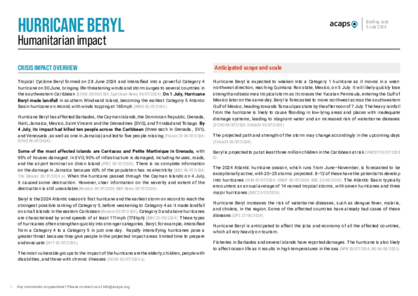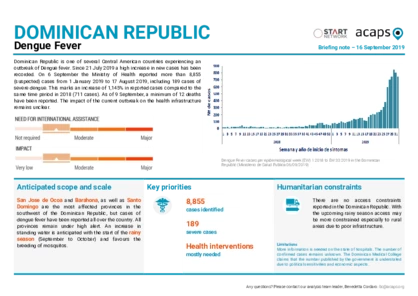Latest updates on country situation
05 November 2024
Since 2021, 437,000 people have been forcibly returned to Haiti. Most (87%) have been returned from the Dominican Republic, Haiti’s only land-bordering neighbour. In 2024 alone, the Dominican Republic returned over 150,000 Haitians (97% of all returnees) and announced plans to send back 10,000 more weekly. This wave of returnees comes amid escalating insecurity, limited access to food and healthcare, and rising internal displacement in Haiti. Many returnees, nearly half of whom were self-employed when they left, may face insecurity and its impacts and struggle to secure jobs. The influx is also likely to put more pressure on host communities' capacity to support those in need, particularly in places such as Grand Sud region and Ouest department, where most of the displaced are settling. (IOM accessed 05/11/2024, IOM 22/09/2024, IOM 12/05/2024)
current crises
in
Dominican Republic
These crises have been identified through the INFORM Severity Index, a tool for measuring and comparing the severity of humanitarian crises globally.
DOM002 - Displacement from Venezuela
Last updated 31/01/2026
Drivers
International Displacement
Crisis level
Country
Severity level
1.9 Low
Access constraints
1.0
Analysis products
on
Dominican Republic
05 July 2024
Impact of hurricane Beryl
DOCUMENT / PDF / 374 KB
On 1 July, Hurricane Beryl made landfall in southern Windward Island, becoming the earliest Category 5 Atlantic Basin hurricane on record. By
4 July, its impact had killed ten people across the Caribbean. Some of the most affected islands are Carriacou and Petite Martinique in Grenada, with 95% of houses damaged.
16 September 2019
Dominican Republic: Dengue fever
DOCUMENT / PDF / 278 KB
Dominican Republic is one of several Central American countries experiencing an outbreak of Dengue fever. Since 21 July 2019 a high increase in new cases has been recorded. On 6 September the Ministry of Health reported more than 8,855 (suspected) cases from 1 January 2019 to 17 August 2019, including 189 cases of severe dengue.



